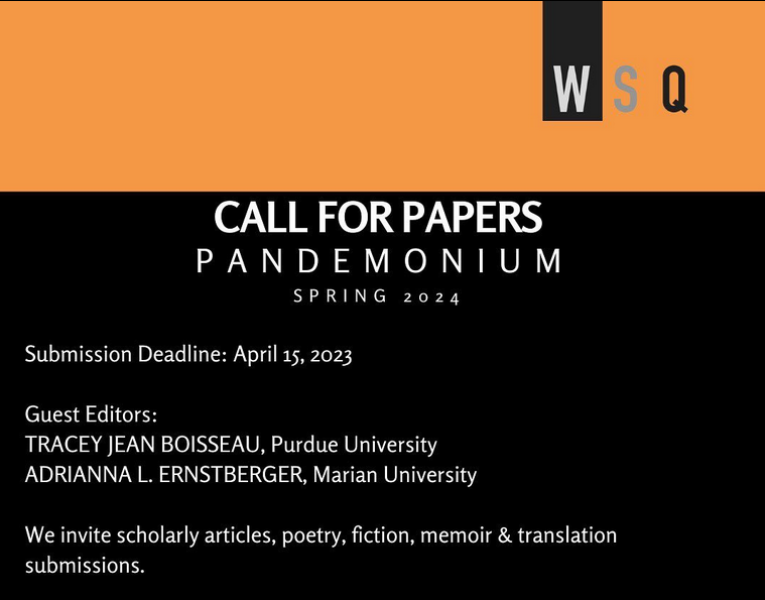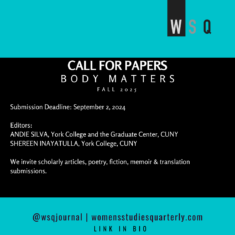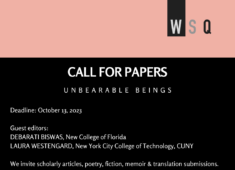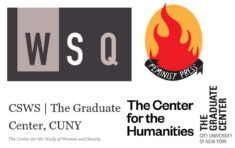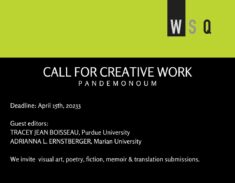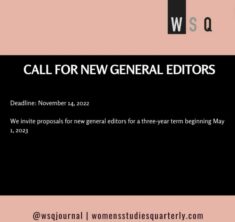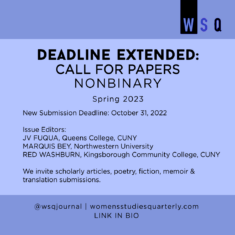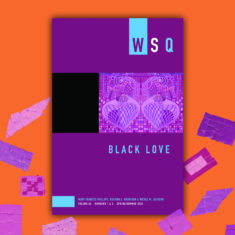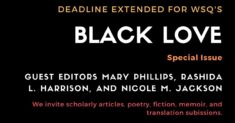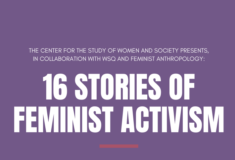About this call for papers
As a partner of Women Studies Quarterly (WSQ), the Center for the Humanities is excited to share this call for papers for a special WSQ issue Pandemonium which will be co-edited by Tracey Jean Boisseau (Purdue University) and Adrianna L. Ernstberger (Marian University), in collaboration with WSQ's publisher The Feminist Press and fellow partner The Center for the Study of Women and Society at the CUNY Graduate Center.
Priority Deadline: April 15, 2023
This special issue of Women’s Studies Quarterly invites reflection on the status, health, precarity, and promise of the discipline of women’s, gender, sexuality, and feminist studies in light of our current state of pandemonium.
By “pandemonium,” we point not only to those tragedies, inequalities, and disruptions to the university and higher education stemming directly from the Covid-19 pandemic but also to the crisis-roiled political context fomenting a barrage of assaults on feminist studies as a discipline in the United States and elsewhere that have been accelerating for several years prior to the pandemic and have only intensified since its outbreak.
We seek submissions from a diverse group of feminist-studies scholars, researchers, teachers, administrators, practitioners, intellectuals, artists, advocates, and leaders, drawing on their research as well as personal experiences, that reveal and analyze the effects of a kaleidoscopic set of conflicts, crises, and pressures affecting their lives, scholarship, work, teaching, careers, institutions, and political organizing, particularly those that are a sign of or hold consequences for the health and survival of the discipline of feminist studies as a whole.
The key elements of “pandemonium” we refer to, beyond those most directly pandemic-related, hinge on decades of neoliberal policy making pushing privatization and commercialization of education. Such policies, in the face of genuine economic crises stemming from the pandemic, as well as “natural” disasters and population dislocations caused by warfare and accelerating climate change, have been used to justify the implementation of so-called austerity measures that have hit nontechnical and especially advocacy fields such as feminist studies the hardest. At the same time, concerted right-wing and authoritarian movements have put feminists as well as women, queer, trans and nonbinary folk, immigrants, refugees, and people of color in their crosshairs. The United States is seeing unprecedented attacks on liberal democratic institutions, escalating “culture wars,” the dismantling of women’s rights and reproductive justice (e.g., the Dobbs decision), as well as increased anti-trans hysteria and anti-intellectual vitriol specifically targeting feminist and anti-racist educators and scholars. Across the globe—in Afghanistan, Argentina, Brazil, Croatia, France, Haiti, Hungary, Nicaragua, Nigeria, Pakistan, the Philippines, Poland, Russia, South Africa, South Korea, Sweden, Turkey, Uganda, the United Kingdom, and elsewhere—emergent anti-feminist, nativist, and white-supremacist political parties as well as established autocratic and authoritarian regimes have instituted blatantly misogynistic, anti-queer, anti-trans, racist, and anti-immigrant legislation, often accompanied by governmental and extra-governmental policies explicitly intended to marginalize, erase, suppress, or extinguish feminist studies as a legitimate academic discipline and teaching field.
Pandemonium creates space for feminist-studies practitioners to consider the tumultuous circumstances we find ourselves in, to document and reflect on recent experiences, and to draw conclusions about the current state—and possible future—of our field. In that spirit, we offer this special issue as a site not only for identifying and assessing existential threats and proliferating crises but also as an opportunity to recognize promising strategies and praxes of resistance that may illuminate new pathways through the pandemonium of our moment, hopefully leading to a stronger future for our discipline.
LIST OF POSSIBLE TOPICS:
Submissions should address ways our discipline-–its individual practitioners as well as organizations and institutions—have been affected by, or have encountered adversity and experienced struggle in the face of:
- The Global Pandemic and a panoply of consequences flowing from it
- Right-wing (white supremacist, anti-immigrant, anti-queer/trans, misogynist, etc.) movements
- Right-wing corporate media and social media
- Authoritarianism, illiberalism, and threats to democratic institutions
- War, invasion, civil strife, and refugeeism
- Neoliberalism, corporatism, and commercialization of education
- Climate-change disasters, environmental degradation, and climate-change denial
- Impoverishment and the “austerity” measures and policies arising from the above
We are keenly interested in contributions that document and evaluate the ways that our discipline and its practitioners exercise and exhibit resistance, revolutionary praxis, and refusal to the above in the form of:
- Scholarly, pedagogical, and administrative strategizing
- Organizational-, institutional- and alliance-building (both inter- as well as intra-disciplinary)
- Public engagement, political activism, and direct action (both on- and off-campus)
- Escape hatches, off-ramps, and alternative social-cultural protest forms and modalities
We welcome contributions that recognize and share artistic and creative endeavors, performances, and cultural interventions offering insight and inspiration regarding the core themes of this issue. Especially encouraged to submit are women; people of color; Black; Indigenous; gender-variant, LGBTQIA+; disabled people; and those whose work is located outside the United States or who collaborate cross-nationally.
Submissions Guidelines
Priority Deadline: April 15, 2023
- Scholarly articles should be submitted to WSQ.submittable.com. Please send complete articles, not abstracts. Please remove all identifying information from the file uploaded to Submittable. We will give priority consideration to submissions received by April 15, 2023. LGBTQIA+, disabled, Black, Indigenous, and people of color are especially encouraged to submit.
- Submissions should not exceed 6,000 words (including un-embedded notes and works cited) and should comply with the formatting guidelines at https://www.feministpress.org/... . For questions, please email the guest issue editors at [email protected].
- Poetry submissions related to the issue theme should be submitted to WSQ.submittable.com. Please review previous issues of WSQ to see what type of submissions we prefer before submitting poems. Please note that poetry submissions may be held for six months or longer. Simultaneous submissions are acceptable if the poetry editor is notified immediately of acceptance elsewhere. We do not accept work that has been previously published. For questions related to poetry submissions, please email the WSQ’s poetry editor at [email protected].
- Fiction, essay, memoir, and translation submissions related to the issue theme between 2,000 and 2,500 words should be submitted to WSQ.submittable.com. Please review previous issues of WSQ to see what type of submissions we prefer before submitting prose. Please note that prose submissions may be held for six months or longer. Simultaneous submissions are acceptable if the prose editor is notified immediately of acceptance elsewhere. We do not accept work that has been previously published. For questions related to creative prose submissions, please email [email protected].
ABOUT WSQ: Since 1972, WSQ has been an interdisciplinary forum for the exchange
of emerging perspectives on women, gender, and sexuality. Its
peer-reviewed interdisciplinary thematic issues focus on such topics as Asian Diasporas, Protest, Beauty, Precarious Work, At Sea, Solidarity, Queer Methods, Activisms, The Global and the Intimate, Trans-, The Sexual Body, and Mother,
combining legal, queer, cultural, technological, and historical work to
present the most exciting new scholarship, fiction, creative
nonfiction, poetry, book reviews, and visual arts on ideas that engage
popular and academic readers alike. WSQ is edited by Red
Washburn (Kingsborough Community College, CUNY), ABOUT WSQ: Since 1972,
WSQ has been an interdisciplinary forum for the exchange of emerging
perspectives on women, gender, and sexuality. Its peer-reviewed
interdisciplinary thematic issues focus on such topics as Asian
Diasporas, Protest, Beauty, Precarious Work, At Sea, Solidarity, Queer
Methods, Activisms, The Global and the Intimate, Trans-, The Sexual
Body, and Mother, combining legal, queer, cultural, technological, and
historical work to present the most exciting new scholarship, fiction,
creative nonfiction, poetry, book reviews, and visual arts on ideas that
engage popular and academic readers alike. WSQ is edited by Red Washburn (Kingsborough Community College, CUNY), Dána-Ain Davis (The Graduate Center, CUNY) and Kendra Sullivan
(Center for the Humanities, CUNY) and published by the Feminist Press
at the City University of New York. Visit
http://www.feministpress.org/w... published by the Feminist Press at
the City University of New York.
